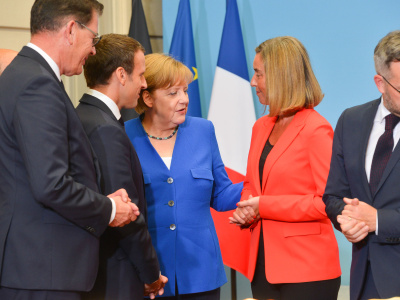
Africa and Brazil: Strengthening and Broadening South-South Agricultural Cooperation
Brazil has been increasingly engaged in South-South Cooperation and tripartite initiatives with Africa, especially in the field of agriculture, where its successes in sustainably increasing production and productivity, without significant expansion of cultivated land, became of high interest for agricultural-based economies.
The Brazilian Technical Cooperation with Developing Countries (CGPD)
Coordinated by the Brazilian Cooperation Agency (ABC) of the Ministry of Foreign Affairs (MRE), the CGPD goes well beyond financial contributions. Its aim is to share Brazilian knowledge and successful experiences in various areas, especially agriculture. The main pillars that guide the CGPD´s strategy are to be driven by demand from the partner countries, aiming to build capacity for autonomous development.
Hence, CGPD is naturally aligned with the national, regional and continental initiatives in which the partner countries are engaged, such as the NEPAD Comprehensive Africa Agriculture Development Program (CAADP).
ABC reaches out and partners with various Brazilian organizations and institutions with proven expertise on a given field in order to jointly elaborate and implement the technical cooperation projects with partner countries. The Brazilian Agricultural Research Corporation (Embrapa) is ABC´s main partner in the field of agriculture and agricultural research.
Embrapa and the Brazilian International Technical Cooperation
Embrapa is a federal, public organization from the Ministry of Agriculture, Livestock and Food Supply (MAPA) founded approximately 40 years ago. It has played a major role in agricultural development in Brazil, with 47 different research centers and more than 2,400 researchers spread all over Brazil.
Embrapa has created the knowledge and technologies leading to a growth of more than 200% in agricultural production and productivity in the past four decades. The development of soil, crop, forest and livestock management techniques, the development and adaptation of new crop and grass varieties, improved livestock breeds and nutrition, and the rational use of the natural resources, allowed Brazil to expand its agricultural area to the Brazilian Savannahs (“Cerrados”), previously considered not suitable for agricultural production. The Cerrados now account for a highly significant share of total agricultural production in the country.
With this past experience and track record in mind, the exchange of knowledge and experiences between Embrapa and its counterparts in Africa might contribute positively to the agriculture development in that continent given the similarities in ecosystems between Africa and Brazil.
In coordination and with financial support from ABC and other international partners, Embrapa co-developed various tools of technical cooperation in order to respond efficiently to the needs of the partner countries and to maximize potential positive impacts. Currently, these tools include:
- Structural Projects: 3 to 5-year projects co-led by the National Agricultural Research Organization and Embrapa, and designed to support the strengthening of the national agricultural research systems. These projects are aligned with the national, regional, and continental priorities and include activities ranging from proposals for institutional re-structuring, test and validation of new varieties of crops, to the rational use of natural resources. These projects typically include a permanent physical presence of Embrapa in the partner countries.
- Africa-Brazil Agricultural Innovation Marketplace: an international partnership co-led by the Forum for Agricultural Research in Africa (FARA) and Embrapa created to fund, in a competitive basis, 2-year collaborative projects between African-based public and private institutions and Embrapa research centers. Projects are funded on thematic areas defined in consultation with FARA and its constituents in alignment with CAADP goals. There are currently 30 projects funded in these thematic areas in 11 countries in Eastern, Western, and Southern Africa;
- Capacity Strengthening Program: a portfolio of training courses developed based on African countries demands by Embrapa Studies and Capacity (Cecat), a specialized Embrapa center, and offered regularly in Brazil to African countries. Since its foundation in 2010, Cecat trained more than 250 African professionals from various countries in more than 9 different courses;
- Short term projects: 1 to 2-year focal projects, typically involving capacity strengthening activities not contemplated in the scope of the other initiatives and designed to respond quickly to point source demands.
The Future
The keystone philosophy of the Brazilian technical cooperation with developing countries is to be driven by demand from the partner countries, aiming to build capacity for autonomous development with no conditions attached. More than with financial resources, the Brazilian Technical Cooperation aims to contribute to global development and food security by sharing knowledge and successful experiences.
Agriculture is and will remain an important sector of the economy of most developing countries and, therefore, an important engine for growth and for the elimination of hunger, poverty and food insecurity.
Brazil is strengthening its institutions and creating innovative mechanism of technical cooperation in order to respond efficiently and effectively to the increasing demands from the partner countries in alignment with their national and regional programs such as, for example, the CAADP.
As the 6th largest economy in the world and a major agriculture exporter, Brazil is expected to play an increasing role in the global policy-making process, broadening and strengthening its partnerships and significantly contributing to global development.
More information on the Brazilian Cooperation Agency and Embrapa is available at: www.abc.gov.br, www.embrapa.br . Information about the Africa-Brazil Agriculture Innovation Marketplace is available at www.africa-brazil.org
Marco Farani is Director of the Brazilian Cooperation Agency. Pedro A. Arraes is President of Embrapa (Brazilian Agricultural Research Corporation)
This article was published in Great Insights Volume 1, Issue 7 (September 2012)



